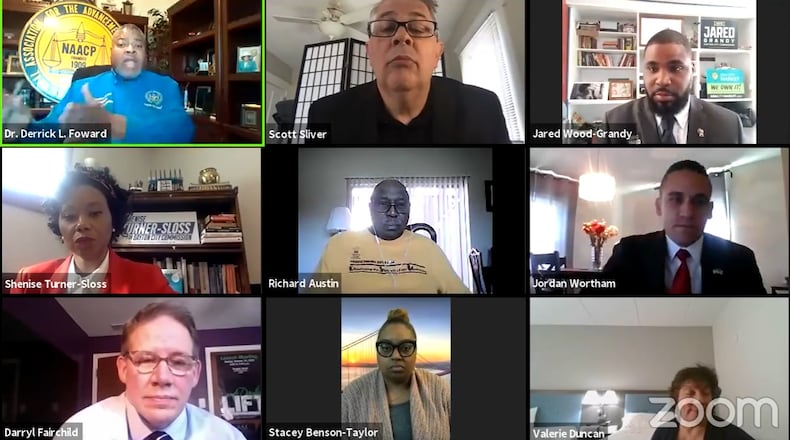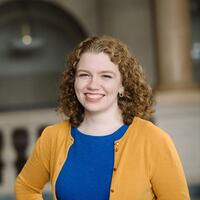Absentee and early voting for the May election begins on Tuesday. The deadline to register to vote is Monday. The primary election is on May 4.
Dayton’s May ballot is full of important issues: multiple changes to the city of Dayton charter, three candidates for mayor and seven candidates for city commission.
The NAACP discussed the changes to the Dayton charter as well as interviewing the candidates for both mayor and city commission.
Dr. Derrick L. Foward, Dayton NAACP president, co-moderated the events with Tom Roberts, second vice president and political action chair for the chapter.
“We are nonpartisan but we will let you know if the candidates don’t support the issues that we support,” Foward said.
He said he called the forums after talking with another member of the NAACP and feeling that the sample ballot provided by the Montgomery County Board of Elections had little information about the issues.
“So people need to be educated prior to voting, which is the main reason we’re having this candidate forum tonight, because voting starts next Tuesday,” Foward said.
The forum for mayoral candidates was held Friday while the forum for commission candidates was held Saturday.
Candidates for mayor are: retired Dayton firefighter Rennes Bowers, former Dayton Mayor Gary Leitzell and Dayton City Commissioner Jeffrey Mims Jr.
Mayor Nan Whaley has announced she won’t run for reelection.
The candidates for city commission are: Stacey D. Benson-Taylor, Valerie N. Duncan, Darryl Fairchild, Jared Grandy, Scott Sliver, Shenise Turner-Sloss and Jordan Wortham. Fairchild is seeking reelection. Two seats are up for election on city commission.
There are six charter amendments on the ballot, which are issues three through eight on the Montgomery County ballot. The NAACP brought in Dayton city law director Barbara Doseck to talk about the issues. Sample ballots are available on the Montgomery County Board of Elections website.
During the mayoral forum, candidates were asked if they supported building a new hospital on the west side of Dayton, since Good Samaritan was closed in 2018.
Here’s how they responded:
Bowers: “Absolutely. I don’t have all the answers to healthcare in your community, but I want to have your input. I want to know what you’re thinking.”
Leitzell: “They should never have torn that hospital down, in my opinion. They should have at least delayed it for four or five years.”
Mims: “We’re working hard with community members to put something in place there in terms of that facility or that location to benefit this community. Additionally, we’re working with other healthcare organizations to make sure they step up their game, so that we can minimize what is being lost by the lack of Good Samaritan being there.”
During the city commission forum, candidates were asked what they would do to invest in neighborhoods.
Here’s how they responded:
Benson-Taylor: “One of the things that we have to do is we have to work on a plan of building our neighborhoods from the inside out. So the city begins to invest in beautification, invest in infrastructure, invest in educating people on the process.”
Duncan: “When it comes to neighborhoods, it’s going to take more than an identity sign and a beautification project. This is going to take a lot of commitment and dedication... And it’s just a lack of commitment, a lack of resources that been earmarked for our neighborhoods.”
Fairchild: “But the key is really around housing, and we can do more than infrastructure as a city. We really need to find a way to encourage homeownership and for some of our older adults, to stay in their homes in safe ways.”
Grandy: “However, we have discontinued and cut off the pipeline between neighborhoods in the city. We need to reinstitute those pipelines. We need to bring back our priority boards and we need to invest in our department of community development.”
Sliver: “Certainly when this money comes down – the federal money comes down – every dollar needs to be allocated purposefully and a great deal of that money needs to go into the neighborhoods.”
Turner-Sloss: “All 65 neighborhoods are not the same. They have different needs; they have a different demographic in which they’re serving. And so that calls for a plan that is going to address every neighborhood, individually.”
Wortham: “I want to make it easier for people to own, invest into a house and I don’t want it to come with a heavy-handed zoning board with inspections and make it more difficult to own a home.”
About the Author

